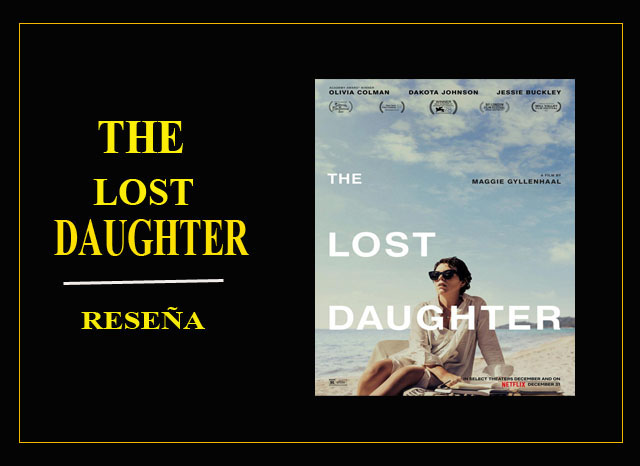
¿Qué necesitamos realmente para nuestra realización personal? Es una de las preguntas que me surgen luego de ver la excelente película The Lost Daugther (2021), de la directora, guionista y actriz norteamerica, Maggie Gyllenhaal.
Llego a este film por la curiosidad que me despertó la lectura de las reseñas hechas por las amigas @dayna199019, aquí y @gorayil, aquí. En ambos escritos ellas daban cuenta del tratamiento particular que la directora da al tema de la maternidad y de cómo esta puede entrabar las aspiraciones de desarrollo personal de la mujer. Este tipo de temas siempre llama mi atención y son lo suficientemente estimulantes como para llevarme a ver un film.

Leda Caruso (Olivia Colman) es una mujer de cuarenta y ocho años que anda de vacaciones en la ciudad de Corinto, Grecia. Es profesora de literatura y al parecer el viaje no es solamente de placer puesto que la mayor parte de su equipaje son libros y constantemente escribe textos mientras está a la orilla del mar.
La tranquilidad de sus vacaciones se ve perturbada por la llegada a la playa de una numerosa familia bastante desconsiderada, también de vacaciones, con jóvenes impertinentes, ruidosos, y que se creen los dueños del lugar. Además, son gente de cuidado puesto que realizan negocios un poco turbios.
Entre los integrantes de esa familia está Nina (Dakota Johnson), una linda joven quien tiene una hija pequeña. Desde el principio las dos captan la atención de Leda, le recuerdan el tiempo de sus años juveniles, cuando más o menos a esa edad era madre de dos niñas. Por la mente de Leda transcurre la película de su vida mientras mira a Nina con su hija.
En un momento en que Nina se descuida la niña se extravía. Comienza una afanosa búsqueda en el mar y la playa. Leda se incorpora al grupo de voluntarios que peina cada centímetro de la zona, y tiene la suerte de ser ella la que encuentre la niña. La toma en brazos, la consuela y se la entrega a los padres. Se convierte en una heroína para la desconsiderada familia. Al devolver a la pequeña se establece una relación de cercanía con Nina. Sin embargo, Leda, por una razón extraña, decide esconder un objeto muy querido para la niña.
Las vacaciones no transcurren con la placidez esperada, cada detalle parece incomodar el frágil temperamento de Leda. La luz de la habitación, las chicharras inoportunas, la impertinencia de los jóvenes, y hasta los caprichos de los pinos que dejan caer sus piñas justo cuando ella pasa, conspiran contra su tranquilidad. Pero a la vez, cada detalle cotidiano sirve para evocar algún momento del pasado de Leda, siempre ligado al tiempo en que estaba con sus hijas pequeñas.
La amistad entre las dos mujeres va creciendo, al punto de que Nina le pide a Leda que haga de Celestina prestándole su apartamento para tener un encuentro amoroso con un joven que ha conocido en la playa. Esto con el fin de evitar que se entere su celoso y violento esposo. Luego de dudarlo un poco Leda accede y concreta una cita para entregarle las llaves a la joven esposa.
Entre tanto la presión por encontrar el objeto perdido se intensifica, hasta en los árboles de la comunidad se pegan carteles solicitando cualquier información. Leda se debate indecisa en qué hacer con él, si lo entrega o lo bota, se siente atrapada. Al final se decide a entregarlo. Y cree que el mejor momento es cuando se vea con Nina para darle las llaves del apartamento.
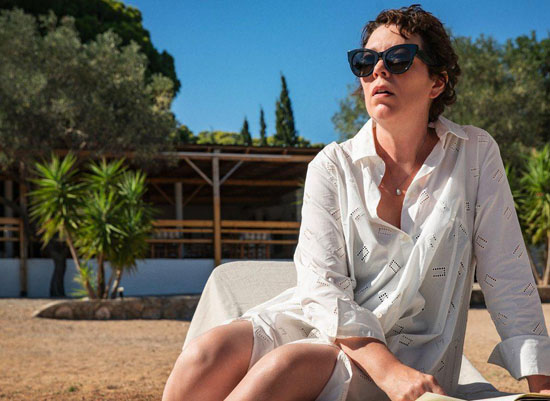
Pero Nina no va a tomar la devolución del objeto de buena manera, no logra comprender el comportamiento de Leda, no entiende por qué lo escondió. En medio de un arrebato de rabia la agrede causándole una peligrosa herida, que nos remonta al inicio de la película donde todo cobra sentido.


Al principio la película puede resultar desconcertante, y es comprensible la decepción que puedan tener algunos espectadores. La narrativa no sigue un orden lineal. El uso permanente de los flashbacks puede desubicar a ratos; también contribuye a la desorientación el que la Leda madura y la joven son interpretadas por dos actrices distintas. Lo más usual en estos casos es que lo haga el mismo actor con la ayuda de un buen maquillaje.
Otro asunto que pudiera considerarse como desfavorable es el ritmo lento. Al principio pensé que podía ser una falla en la concepción de la película, pero luego de terminar el visionado me di cuenta que era la manera correcta de plasmar el drama existencial que vive la protagonista.
El film es novedoso en cuanto al planteamiento temático, no abundan las películas donde se ponga en cuestión la maternidad para observarla en lo negativo que puede tener para la mujer. En este sentido, el abordaje hecho por la directora abre la posibilidad de numerosas lecturas interpretativas.
En principio pudiera pensarse que solo se trata de una película sobre el conflicto que conlleva la maternidad en una sociedad donde la mujer tiene múltiples opciones y está presionada a cumplir varios roles. Eso está allí, y no es ninguna exageración decir que en esos primeros años de la crianza la atención que exigen los niños interfiere hasta en la manera de poder experimentar la sexualidad de la madre. Esos tiempos son muy exigentes y aun contando con la colaboración necesaria es inevitable postergar muchos planes, de estudio, trabajo o esparcimiento.
Pero más allá, en el film se puede percibir otro problema de fondo y que afecta no solo a la mujer sino a todos los sujetos en la sociedad contemporánea. Es la ilusión de que el sujeto puede vivir y realizarse plenamente sin ningún lazo que lo ate a nada ni a nadie, sin vínculos comunitarios y sin vínculos familiares fuertes como pueden ser los hijos, los que se convierten en un estorbo para poder ser “libre como el viento”.
El sujeto una vez que ha roto todos los vínculos queda permanentemente acechado por el fantasma de la soledad y la falta de sentido en la vida. El vacío existencial, la ausencia de propósitos, y el hartazgo producido por el tedio, son unos de los dramas principales de nuestro tiempo.
La directora parece explorar esa idea de la soledad en el mundo actual. Leda elige la opción de entregarse a esa libertad sin límites, y durante tres años vivió un tiempo que le pareció “maravilloso”, pero que no le dejó una gran satisfacción como para poder llegar a los cuarenta y ocho años sintiéndose feliz y con estabilidad emocional. Por el contrario, es una mujer con conflictos muy fuertes. ¿Si el hacer lo que nos venga en gana no nos hace felices, qué se necesita entonces para conseguir la felicidad?
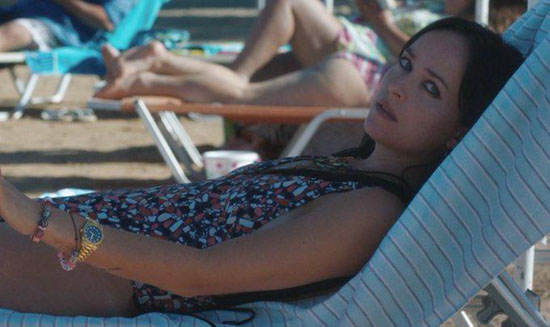
No pude llegar a la conclusión de que la directora apueste por el fin de la maternidad. No, Más bien parece reivindicar la familia como lugar de apoyo para el sujeto. Los perturbadores que llegan a la playa son una familia extensa; es verdad que muchos son malvivientes, pero es allí donde Nina está con su hija, a diferencia de Leda que aparte de su esposo no tiene familia en la que apoyarse, porque se refiere a la madre como una persona a la que no le confiaría sus hijas. Además, en ese clan familiar, en plan vacacional, está otra mujer madura con una gravidez avanzada, y ambas, tanto Nina como ella, parecen no tener rollos con el tema de los hijos.
Hay un dato que también serviría para dudar si la directora apuesta por el fin de la maternidad: Leda se define a sí misma “como una madre antinatural”. La directora la excluye de la norma. El problema entonces es algo relacionado con ella.
Como podemos ver esta es una película muy sugerente, rica en posibilidades interpretativas, por lo que a mi juicio es una buena película, es el tipo de cine que me encanta ver.

Desde el punto de vista de la realización la película está bien planteada. La fotografía está compuesta por primeros planos y planos de detalle, lo que nos obliga a meternos dentro del personaje y vivenciar sus conflictos.
En el plano actoral todos cumplen muy bien con sus papeles. Empezando por Olivia Colman, una actriz que nos hace sentir plenamente el gran drama de Leda, con sus angustias, insatisfacciones, amarguras y dudas. Otro gran papel lo desarrolla Dakota Johnson, una madre joven que no se siente muy cómoda con el esposo que tiene y que se atreve a explorar el riesgo de los amores furtivos.
Este es el tipo de películas que admite varios visionados para entenderla plenamente. Si les gustan los films donde se exploren situaciones intimistas y donde haya un gran desarrollo de los personajes, “The Lost Daughter”, les puede gustar.
Gracias por tu tiempo.


What do we really need for our personal fulfillment? That's one of the questions that I have after watching the excellent film The Lost Daughter (2021), by the American director, screenwriter and actress, Maggie Gyllenhaal.
I came to this film because of the curiosity aroused by reading the reviews made by friends @dayna199019, here and @gorayil, here. In both writings they gave an account of the director's particular treatment of the subject of motherhood and how it can hinder a woman's aspirations for personal development. These kinds of themes always catch my attention and are stimulating enough to get me to see a film.

Leda Caruso (Olivia Colman) is a forty-eight year old woman vacationing on the city of Corinth, Greece. She is a professor of literature and it seems that the trip is not only for pleasure since most of her luggage are books and she is constantly writing texts while she is at the seashore.
The tranquility of her vacation is disturbed by the arrival on the beach of a large and rather inconsiderate family, also on vacation, with impertinent, noisy young people who think they own the place. In addition, they are careful people since they are engaged in shady business.
Among the members of this family is Nina (Dakota Johnson), a pretty young woman who has a young daughter. From the beginning the two capture Leda's attention, they remind her of the time of her youth, when at about that age she was the mother of two girls. Through Leda's mind runs the movie of her life as she watches Nina with her daughter.
At a moment when Nina is careless, the girl goes astray. A search in the sea and on the beach begins. Leda joins the group of volunteers combing every inch of the area and is lucky enough to be the one to find the child. She takes her in her arms, comforts her and hands her over to her parents. She becomes a hero to the thoughtless family. By returning the little girl, a close relationship with Nina is established. However, Leda, for a strange reason, decides to hide an object dear to the child.
The vacation does not go as smoothly as expected, every detail seems to disturb Leda's fragile temperament. The light in the room, the inopportune cicadas, the impertinence of the young people, and even the whims of the pine trees that drop their pinecones just as she passes by, conspire against her tranquility. But at the same time, every daily detail serves to evoke some moment of Leda's past, always linked to the time when she was with her young daughters.
The friendship between the two women grows, to the point that Nina asks Leda to play the role of Celestina by lending her her apartment in order to have an amorous encounter with a young man she has met on the beach. This in order to prevent her jealous and violent husband from finding out. After some hesitation, Leda agrees and makes an appointment to give the keys to the young wife.
Meanwhile the pressure to find the lost object intensifies, even on the trees of the community posters are pasted asking for any information. Leda is undecided about what to do with it, whether to hand it in or throw it away, she feels trapped. In the end she decides to turn it in. And she thinks the best time is when she meets Nina to give her the keys to the apartment.

But Nina is not going to take the return of the object in a good way, she can't understand Leda's behavior, she doesn't understand why she hid it. In a fit of rage, he attacks her, causing her a dangerous wound, which takes us back to the beginning of the film, where everything makes sense.


At first the film can be disconcerting, and some viewers may be understandably disappointed. The narrative does not follow a linear order. The constant use of flashbacks can be disorienting at times; also contributing to the disorientation is the fact that the mature Leda and the young Leda are played by two different actresses. The most usual in these cases is that it is done by the same actor with the help of a good makeup.
Another issue that could be considered unfavorable is the slow pace. At first I thought it could be a flaw in the conception of the film, but after finishing the viewing I realized that it was the right way to capture the existential drama that the protagonist lives.
The film is novel in terms of the thematic approach, there are not many films where motherhood is questioned in order to observe the negative aspects it can have for women. In this sense, the director's approach opens the possibility of numerous interpretative readings.
In principle, one might think that this is only a film about the conflict that motherhood entails in a society where women have multiple options and are pressured to fulfill various roles. That is there, and it is no exaggeration to say that in those early years of parenting the attention demanded by the children even interferes with the way the mother's sexuality can be experienced. Those times are very demanding and even with the necessary collaboration it is inevitable to postpone many plans, study, work or leisure.
But beyond that, in the film we can perceive another underlying problem that affects not only women but all subjects in contemporary society. It is the illusion that the subject can live and be fully realized without any ties that bind him to anything or anyone, without community ties and without strong family ties such as children, which become a hindrance to be "free as the wind".
Once the subject has broken all ties, he is permanently haunted by the ghost of loneliness and the lack of meaning in life. Existential emptiness, the absence of purpose, and the weariness produced by boredom, are some of the main dramas of our time.
The director seems to explore this idea of loneliness in today's world. Leda chooses the option of giving herself to that freedom without limits, and for three years she lived a time that seemed "wonderful" to her, but that did not leave her with a great satisfaction so as to be able to reach the age of forty-eight feeling happy and emotionally stable. On the contrary, she is a woman with very strong conflicts. If doing whatever we want does not make us happy, what does it take to achieve happiness?

I could not come to the conclusion that the director is betting on the end of motherhood. No, rather she seems to vindicate the family as a place of support for the subject. The troublemakers who come to the beach are an extended family; it is true that many are lowlifes, but it is there that Nina is with her daughter, unlike Leda who apart from her husband has no family to rely on, because she refers to the mother as a person she would not trust with her daughters. In addition, in that family clan, on vacation, there is another mature woman with advanced pregnancy, and both Nina and she seem to have no children.
There is a fact that would also serve to doubt whether the director is betting on the end of motherhood: Leda defines herself "as an unnatural mother". The director excludes her from the norm. The problem then is something related to her.
As we can see this is a very suggestive film, rich in interpretative possibilities, so in my opinion it is a good film, it is the kind of cinema I love to see.

From the point of view of the realization the film is well planned. The photography is composed of close-ups and detailed shots, which forces us to get inside the character and experience their conflicts.
In terms of acting, all the actors fulfill their roles very well. Starting with Olivia Colman, an actress who makes us fully feel the great drama of Leda, with her anguish, dissatisfaction, bitterness and doubts. Another great role is played by Dakota Johnson, a young mother who is not very comfortable with the husband she has and who dares to explore the risk of furtive love affairs.
This is the kind of film that admits several viewings to fully understand it. If you like films where intimate situations are explored and where there is great character development, "The Lost Daughter", you might like it.
Thank you for your time.
Translated with www.DeepL.com/Translator (free version)

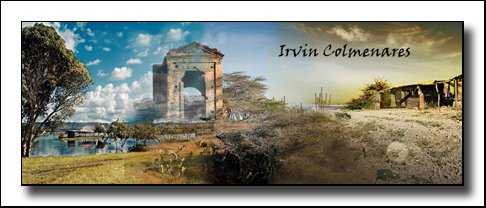





Te invito a apoyar este proyecto como witness y a formar parte de esta gran comunidad uniéndote a su Discord en el siguiente enlace:
Discord de la comunidad Cervantes

You can vote for @ocd-witness, with HiveSigner or on Hive Witnesses.

Otras reseñas. | Other reviews:

Otras reseñas. | Other reviews:

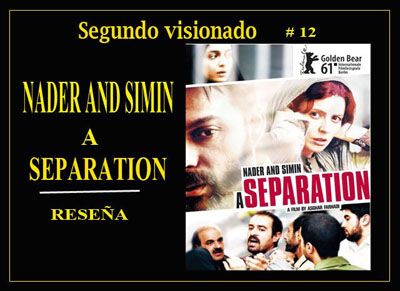
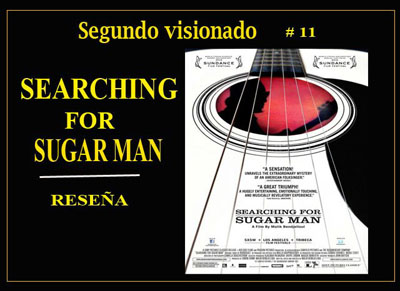

Una interesante recomendación, no la había considerado, pero estará en mi nueva lista.
Gracias por compartir amigo. Excelente reseña como siempre.
Saludos con cariño
El tema es interesante. Trata de verla y haces la reseña con tus impresiones. Muchas gracias por pasar y comentar, mi querida @slwzl. Que estés bien. Un fuerte abrazo desde Maracay.
Por tu reseña es una película que hay que ver. Un tema profundo que lleva a cuestionar ciertos planteamientos sociales y los vacíos existenciales. Porque si bien es cierto que la realización personal se ha vendido como que se puede encontrar fuera de uno, lo relacional es lo que nos define...
Gracias excelente reseña @irvinc, voy anotada en la lista de verla pronto.
Seguro que te va a gustar. El tema es realmente interesante y cuenta con buenas actuaciones. Muchas gracias por pasar y comentar, estimada @damarysvibra. Que estés bien. Un fuerte abrazo.
Enhorabuena, su "post" ha sido "up-voted" por @dsc-r2cornell, que es la "cuenta curating" de la Comunidad de la Discordia de @R2cornell.
Thank you so much.
Gracias por recordarme querido amigo, me encanto tu reseña ciertamente tuviste la visión correcta sobre el film y la explicación nos hace entender un poco de que va esta película, es intensa en cuanto a lo emocional desde el punto de vista de la mujer y ese papel de lo maternal, porque si es cierto que no es un rol nada fácil sobretodo los primeros años de crianza, que fabulosa interpretación le diste a la historia, ME ENCANTO!!! Graciaaaasss por mencionarme!! Un fuerte abrazo. Bendiciones
Me alegra que haya sido de tu agrado. Sí, la película es muy intensa desde el punto de vista emocional. Eso del abandono lo estamos viviendo mucho aquí, cantidades de mujeres dejan los hijos con familiares para emigrar y buscar mejores condiciones de vida, eso indudablemente debe ser traumático. La diferencia es que ellas lo hacen impulsadas por la necesidad, quizá el efecto en esos casos sea distinto. Me gustó mucho la película. Muchas gracias por pasar y comentar , estimada @dayna199019. Que estés bien. Un fuerte abrazo desde Maracay. Bendiciones.
Tienes muchas razón yo conozco muchas mujeres madres que se han ido del país para poder ayudar a su familia y a sus hijos, es lamentable por los niños, porque por más que sea ellos siempre van a querer estar es con su madre y nadie como la mamá de uno, saludos amigos, bendiciones!
Así estamos, estimada @dayna199019. Amén. Bendiciones para ti. Tú tienes usuario de Discord?
Yo creo que el gran acierto de esta película es el abordaje de la historia, la cual permite distintas interpretaciones según la percepción de cada espectador. El reconocimiento a Maggie Gyllenhaal es bien merecido.
Sí, es el tipo de películas que no deja indiferente, se puede discutir sobre ella largo tiempo. Muchas gracias por pasar y comentar. Estimada @gorayii. Que estés bien. Un fuerte abrazo desde Maracay.
The rewards earned on this comment will go directly to the person sharing the post on Twitter as long as they are registered with @poshtoken. Sign up at https://hiveposh.com.
Excelente post hermano!!!!
Me alegra que haya sido de tu agrado. Muchas gracias por pasar y comentar.
Interesante argumento
Muchas gracias por pasar y comentar.